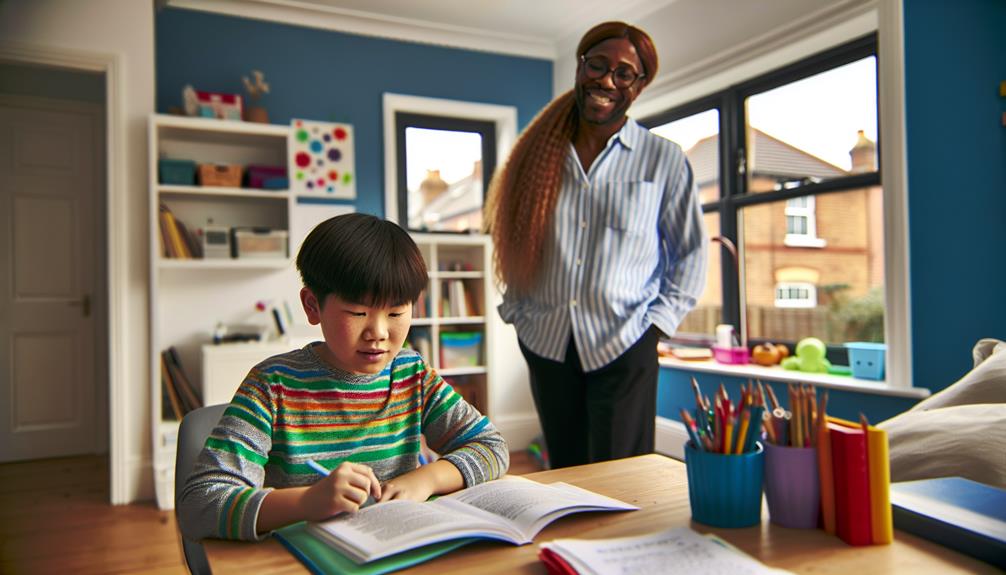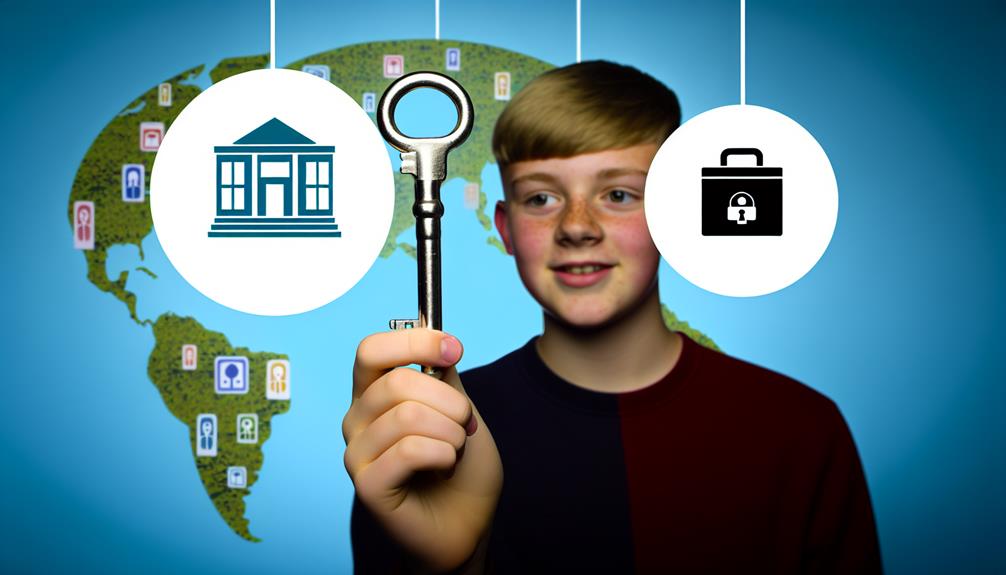In UK foster care, children's rights are strongly upheld. They're protected from harm and entitled to their safety and well-being. They're guaranteed quality education and healthcare, including regular medical checkups and mental health support. They're also entitled to maintain contact with their biological family, aimed at preserving a sense of identity and belonging. Children have an active role in decisions impacting them. If their rights are violated, they can lodge a complaint. It's a complex system balancing child protection with parental rights, but it always puts kids first. There's more to explore to deepen your understanding.
Key Takeaways
- Children in UK foster care have the right to safety, well-being, and protection against harm, including mental and physical health provisions.
- They are guaranteed quality education, including equal opportunities and active involvement in their educational journey.
- Foster children have the right to maintain contact with their biological family and support in nurturing those relationships.
- They have the right to participate in life-impacting decisions, emphasizing the importance of their voices and informed consent.
- Children also have access to comprehensive health and social services, and the right to lodge a complaint if their rights are violated.
Understanding UK Foster Care System

To fully grasp the issue of children's rights, you first need to understand how the UK foster care system operates. It's a system designed with the child's best interests at heart, yet it's often clouded by the 'Foster Care Stigma'. This, you'll find, can negatively influence the child's experience and their perception of self-worth.
Now, the UK foster care system primarily aims to provide a safe, nurturing environment for children who can't live with their biological families. The ultimate goal is to reunite these children with their families whenever possible. However, when family reunification isn't an option, the 'Adoption Process' kicks in.
Navigating the adoption process can be complex, with various stages including assessment, matching, and finally, placement. It's a rigorous process, designed to guarantee that each child is placed in a loving, stable home that meets their unique needs.
Understanding this system is vital to addressing children's rights. You see, only when we're aware of the system's operations, its challenges, and stigmas, can we begin to advocate for improved conditions and enhanced rights for these vulnerable children. You, as a result, hold an important role in shaping their future.
Legal Framework Supporting Childrens Rights
Now, let's explore the legal framework that supports children's rights within the UK foster care system. At the heart of this structure are vital legal terminologies and the concept of parental consent.
In the UK, the Children Act 1989 and 2004 set the main legal foundation for child protection, creating a balance between the need for councils to intervene and the rights and duties of parents. This is where parental consent becomes essential, as authorities must, in general, have the parents' agreement to accommodate a child.
To fully grasp the significance of this, it's crucial to understand these key legal terminologies:
- Parental Responsibility: This is the legal rights, duties, powers, responsibilities and authority a parent has for a child.
- Accommodation: This refers to the provision of housing or lodging by a local authority or a foster parent.
- Care Orders: These are court orders that place a child under the care of a local authority.
- Voluntary Accommodation: This is when a parent or guardian voluntarily places a child in the care of a local authority.
In essence, the legal framework ensures that the rights and welfare of children are always the priority, while also respecting the rights of parents.
Right to Safety and Well-being

When you think about the rights of children in UK foster care, it's crucial to focus on their right to safety and well-being. This includes protection against harm, mental health support, and provisions for their physical health.
Let's explore together how these crucial protections are enacted and maintained.
Protection Against Harm
In the domain of UK foster care, your child's safety and well-being takes centre stage, guaranteeing strong protection against any form of harm. Measures are put in place to combat the foster care stigma and include cultural sensitivity training for all foster carers.
Moreover, the UK foster care system guarantees that:
- Cultural sensitivity training equips foster parents to understand and respect your child's cultural background.
- Children's rights are upheld, preventing any physical, emotional or psychological harm.
- The foster care stigma is reduced through education and advocacy.
- Complaint and reporting systems are in place, allowing swift action when rights are infringed.
The right to protection goes hand-in-hand with your child's overall well-being, setting the foundation for them to thrive in their new home.
Mental Health Support
Beyond the physical safety measures, your child's right to mental health support is a crucial concern in the UK foster care system. Recognising the potential traumas faced by foster children, the system prioritises Therapeutic Interventions, providing personalised counselling and therapies to address mental health issues.
Stigma Reduction is also a key focus, fostering an environment where children are encouraged to express their feelings without fear of judgement. Equally essential is the provision of mental health education for foster parents, equipping them with essential skills to support their foster child's mental well-being.
The system's goal is to nurture not just a physically safe space, but a psychologically secure one, a haven where children can heal, thrive and develop resilience. Your child's mental health isn't an afterthought—it's a priority.
Physical Health Provision
While the mental health of your child is certainly prioritised, the UK foster care system also deeply values their physical health and safety. With a focus on the child's Nutritional Needs and Exercise Importance, the system guarantees a holistic health approach.
- Nutritional needs are fulfilled through balanced meals, with foster families guided on how to accommodate specific dietary requirements.
- Exercise is emphasized as essential, encouraging children to participate in physical activities.
- Regular health check-ups are obligatory, ensuring early detection of any potential issues.
- Foster care also addresses any specific health needs, such as medication or therapy.
Ensuring Proper Education

As a foster parent, you're responsible for guaranteeing your foster child receives a quality education, as this is a fundamental right protected under UK law. This commitment to education equality means that you need to make sure your foster child has the same educational opportunities as any other child.
You should be actively involved in their educational journey, from attending parent-teacher conferences to assisting with homework assignments. Your home should be a conducive environment for learning, where they're encouraged to pursue academic excellence.
Extracurricular opportunities also play a pivotal role in a child's development. Whether it's sports, arts, or science clubs, these activities can enrich their learning experience, foster social skills and boost confidence. As a foster parent, you have a duty to facilitate and support these opportunities.
Remember, education isn't just about academics. It also involves teaching life skills and values. As a foster parent, you're in a unique position to nurture these aspects, hence providing a holistic education that can set them up for success in later life.
You're not just offering them a home, but a chance to thrive. And a quality education is a significant part of that opportunity.
The Importance of Contact With Family
You may wonder why contact with family is so vital in the context of foster care.
It's not just about maintaining family bonds, but also considering the legal aspects of contact and the profound emotional impact it has on children.
Let's explore these points to better understand their significance in safeguarding children's rights in UK foster care.
Maintaining Family Bonds
In the realm of foster care, maintaining lasting connections with their biological families isn't just essential, it's a fundamental right for children that profoundly influences their well-being and emotional development. You should understand why fostering family bonds is vital:
- It aids in cultural preservation, allowing children to retain essential aspects of their heritage and identity.
- Fosters sibling relationships, which provide a sense of stability and continuity.
- Helps children understand their background, promoting self-esteem and resilience.
- Facilitates smoother shift back into their biological family, when possible.
As someone aiming for excellence in foster care, you must prioritize this right, recognizing its impact on the child's emotional health and future relationships.
Legal Aspects of Contact
Handling the legalities of maintaining contact with biological families can greatly impact a child's experience in foster care. It's important to grasp the Contact Legislation in the UK, an essential framework ensuring the child's right to keep familial bonds alive while in care. This legislation reinforces the Parental Responsibilities inherent to birth parents, despite the child's foster placement.
It's not about severing ties; rather, it supports meaningful relationships with biological families, given the circumstances are in the child's best interest. As a foster parent, you play an important role in upholding these rights, balancing the child's need for a stable environment and maintaining vital family connections.
The legal aspects of contact are indeed as fundamental as other rights in a child's foster care journey.
Emotional Impact on Children
Maintaining contact with their biological family can greatly affect a child's emotional well-being while in foster care. This connection can offer comfort, familiarity, and continuity, which can aid in trauma coping strategies.
- It helps children preserve their identity and sense of belonging.
- It can mitigate feelings of abandonment and foster resilience building.
- It can provide an opportunity for healing and reconciliation.
- It can help children understand and process their circumstances.
Right to Participate in Decisions
As a foster child in the UK, you're entitled to have a say in decisions that directly impact your life. This principle, known as 'Informed Consent', underpins the child welfare system. It involves being provided with all the necessary information, understanding this information, and then making an informed choice about what you believe is best for you.
In practice, this means you can contribute to decision-making processes concerning your education, foster placement, and even court proceedings. Your opinion matters, and it's essential that your voice is heard and taken into account. This is all part of 'Decision Making Empowerment'. Your foster carers, social workers, and anyone else involved in your care must respect this right.
Access to Health and Social Services

In the domain of your foster care rights, you're also entitled to extensive health and social services. This means you have access to a wide range of services aimed at promoting your wellbeing. These services aren't only about treating illness but also about prevention and fostering a healthy lifestyle.
As part of these services, you're provided with:
- Regular medical, dental and eye check-ups.
- Nutritional guidance, ensuring you get a balanced diet.
- Mental health support, including counselling or therapy if needed.
- Cultural inclusion in service delivery, making sure your cultural background is respected and considered.
You have the right to these services, and they're adapted to suit your specific needs. They're designed to help you grow and develop in a healthy, supportive environment. Remember, it's not just about immediate care, but also about equipping you with the knowledge and skills to maintain your health in the long run.
Your rights in foster care are extensive and are there to protect you. It's important that you understand these rights, and that you feel empowered to advocate for yourself. Access to health and social services is a key part of this.
Complaint Procedures in Foster Care
While understanding your rights to health and social services is pivotal, it's equally important to know the complaint procedures in foster care, should you ever need to voice concerns about your treatment or conditions.
In the UK foster care system, you have a right to lodge a complaint if you believe your rights have been violated. You're encouraged to speak out, as it's a vital part of ensuring foster accountability. The first step is to communicate your concerns with your social worker or the person in charge. If they can't resolve the issue, it will be escalated to the complaints department of the fostering agency or the local authority.
The complaints procedure is designed to provide a clear route towards complaint resolution. It's a three-tiered process: the problem-solving stage, the investigation stage, and the review panel stage. Each stage offers an opportunity for the issue to be addressed and resolved.
Frequently Asked Questions
What Kind of Training Do Foster Parents Receive in the Uk?"
In the UK, you'd receive thorough parental preparation and foster education. This includes training in communication, child development, safeguarding, and managing challenging behaviors, equipping you to provide the best care for your foster child.
Are There Any Specific Benefits for Foster Children After They Turn 18?"
Yes, there are specific benefits for you after turning 18. In the UK, 'Post 18 support' includes help with housing, finances, and continuing education opportunities to assist with your shift into independent living.
How Are the Mental Health Needs of Foster Children Addressed in the Uk?"
In the UK, your mental health needs as a foster child are carefully addressed. Through stigma reduction campaigns and therapeutic interventions, you're guaranteed access to mental health services specifically tailored for your unique circumstances.
What Kind of Support Is Available for Foster Parents to Help Them Fulfill Their Responsibilities?"
In the UK, you're provided with financial aid and access to support networks to help fulfill your foster care responsibilities. These resources ease the process and guarantee you're not alone in this significant journey.
Do Foster Children in the UK Have the Right to Seek Independent Legal Advice?"
Yes, you've the right to seek independent legal advice in the UK as a foster child. You're entitled to access legal representation and your discussions with your lawyer are confidential as per advice confidentiality rules.
Conclusion
In the UK, children's rights in foster care are designed to provide a complete, not a prison. They guarantee safety, education, family contact, decision-making, and access to health services.
If unsatisfied, they can raise grievances, voicing their concerns. It's a thorough system, aiming to offer kids a nurturing environment while ensuring their voices are heard.
Hence, understanding these rights is key to delivering the care every child deserves, making them feel valued, respected and most importantly, loved.




